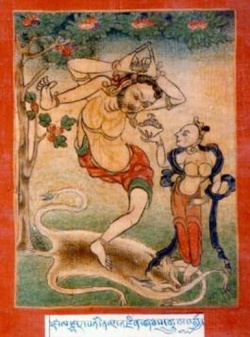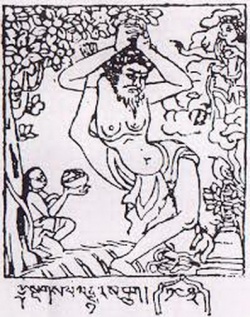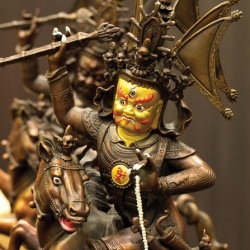Jalandhar Nath
About Jalandhar-nath it is known that he was Mahasiddha yogi and direct disciple of Śiva, some says he was Śiva himself (who entered into the dead body liying on cemetry). Also he is known in different traditions under different names as Jalandharipa, Haddipa, Haddipad, Hallipad, Jalandarpad and so on. Also he appearing in the both lineages of transmission, in the Shaiva Natha tradition of Hinduism, and in the Tantric Buddhist tradition of Tibet. With his name traditionally connected the practice of Jalandhara-bandha and the invention of Hevajra tantra, it is told that he was the author of few books: Śuddhivajra pradīp (the commentary on Hevajra Tantra), Hevajra-sadhana (the commentary on Hevajra Tantra). He was the great practitioner of the Tantric yoga and in the course of his practice he has acquired miraculous yogic powers, and control over life and death. In some versions of the story about the king Gopichand, he appears as demonstrating his fierce temperament.
In accordance with Tibetan tradition he was born in the some village named Nagarbhog, in one Brahmins family. From young age he was disappointed with world or samsara (the world of mundan existense). Once he was sitting on the shmashan and thinking about non-permanence of life. At that moment he was approached by one Dakini , who told him, that one must keep own mind pure and clean. She initiated him into the Great path of Yoga, by which liberation is achieved, and supernatural powers could be acquired. She called it “Hevajra tantra marg”. Under her guidance he became absorbed in the difficult sadhana. After seven ears of practice, he has reached desired perfection in his practices. He widely traveled in India for propagating yoga and dharma, and many places of the country are connected with his name. The most well known events of his life have happened when he reached the place where raja Manikchand was living.
Story of Jalandar Natha in accordance with Tara Natha
"He was born in the low cast family, in the city called Thatha, in Sindu, the country of the west. His guru was ācārya Kambala. Once Jalandhari listened a voice from heaven, which told him to go to Udayāna and meditate there; there only he would get desired siddhis (perfection). Therefore, he went to Udayāna, got lessons from the king Indrabhuti, the godly- woman Lakṣmikarā and from ācārya Kackapāda instructions in Tantras. Then he meditate for ten days on Smaśāna, where he received open entrance to the Maṇdala of Srī-herukā and Abhiśeka from Dakinis, and arrived at once at the grade of Mahāmudrāsiddhi (the perfection in yoga). Thereafter, he engaged himself in every way for salvation of living creatures whilst he was living in this country for a long time.
After this, the acarya lived in the country of Jalandhara (modern Panjab plus Himachal Pradesh), at the place where fire comes out between water and stones (Jwala mukhi in Kangra valley of Himachal); Because he spent there quite a lot time, he received name Siddha Jalandhari…
…In order to convert the countries in the east, he took the figure of a Hāḍi, sweeper, so was called caste of people who were sweeping streets in the city Catigrāma in Bengal. In this country, young king Gopicandra sat on the throne not very long time ago, after his father raja has died. The young king was very handsome, and he used to spend lot of time enjoying the company of beautiful women.
His mother Menavanti was not happy with such situation, because she loved him very mach, and she always was thinking and worried that one day will come, when his butifull body will die. Once in the morning his mother Menavanti saw acarya at king’s garden. While he was sitting under cocoanut tree there, he prononce: ‘Nārikela Bhikṣavo’ and cocoanuts fly to him by themselves. After drinking water from cocoanuts, he ordered them to return back to their places (by saying ‘Nārikela Uparajāhi’) what they did so.
On seeing this happening, Menavanti has realized that he was an accomplished Siddha who has control over powers of nature to create and destroy, of life and death. Some time latter tears appeared in her eyes in the presence of her son, and when the young king noticed this, he asked her about reasons of it.
She answered: “Even if you will get much bigger kingdom then you have now, ten times more than power and wisdom of your father, still one thing is here, which makes me sad. Your beautiful body one day going to be destroyed, and this is the reason of my constant sorrow."
Is there any way to dispel your sorrow, tell me, how I can escape death? The son asked her.
On what mother have told him that the street sweeper of their palace has power to conquer it.
Then Gopicandra came to Jalendhara and asked him about the instructions how to avoid death.
Jalendharnath answered, that he can’t do this while he will remain on throne.
Gopicandra insisted that after getting initiation, he will renounce his throne, so they agree on this. Then they together went to the jungle. There acarya given him an empty pitcher and asked him to put hand into it. When Gopichandra did it, acharya asked him quickly, now tell me quickly what was there. As king found nothing in the puthcher, he answered that there is nothing, on what he was told by Jalendharanatha that immortality is like this. Unsatisfied by such lesson the king asked from him, three more times to teach him immortality, and each time this procedure was repeated, and he got the same answer. At last, Gopichandra have lost control of himself, and thinking acarya to be charlatan, he ordered to put him into well and cover him with the elephant and horse dung mixed with thorns.
One more version
To see how much different can be one and the same story, I will present here one more version story of Jālandharnāth given by Doctor Kalyani Malik in her book, and based on folk songs and ballads of Bengal. In accordance with it, he was the disciple of Guru Goraksh Nath, and prior to it prince of Hastināpur (modern Delhi). Raja Gopīcandra was the ruler of Bengal in eleventh century, with his capital in Comilla (modern Bangladesh), and in accordance with prediction made by astrologers, his life time was going to be very short. His mother was queen Mayanāmati, who was at the same time disciple of Gorsksh Nath. Goraksh nath ordered her to conviince her son to become Yogi and accept street cleaner Hāḍipā (jalandhari) as his guru. At first Gopīcandra resisted this idea, and with help of two his wives, Adunā and Padunā put her under different very difficult tests. She was made walk on fire and on a bridge of hairs. She was drownned in water and given poison to swallow. But by uttering name of her guru (Śiva Goraksha), she passed all test and convinsed him in great powers of yoga. After it he rennounced his throne and became disciple of Hāḍipā. Later as yogi he suffered untold of misery.
In accordance with one more version of his story, found in drama discovered in Nepal, he was king of city Jalendhar (modern Panjab), and has seven hundred qeens prior to becoming yogi.
Story of Guru Jalandharipa
(In accordance with Caturaśīti-siddha-pravṛitti)
Story of Jalandharipa is in such manner: Jalan-dhar means one who is keeps (dhar) the net (jalan). He lived at the city Thortha and was Brahman by caste. Once he, being tired from the world matters and filling bitter disappointment in the life, came to the smashan (burning ground) and sit there on a root of a tree. There, after some time, he found himself in inner peace and comfort. At that moment from the sky words of the Dakini have came, “Listen my son! Contemplate on yoni as on source of all that exist.” After listening this he became exited and overfilled with happiness. At last Dakini revealed himself to him, and initiated him into Hevajra Mandala. She give him initiation in such order:
“Withdraw your attention from all possible external objects and limit it in your body, words and mind. Then center your concentration on “Mulatrik” - the place from where they organized. Unite three energy channels into one middle channel and move energy up in it. After piercing one by one the Chakras where all latent impressions, memory and imagination are rest, collect them and push out trough brahmarandha (hole in the scull, so called ‘tenth door’).
Move your attention from the all external objects,
And at first limit it in your body, speech and mind,
Then unite right and left (nadis) in Avdhuti (central channel),
And move it to the Brahmadvara (the Door of Brahma, crown of head)
When you will reach there,
You will enter into the state of experiencing of Śūnyatā,
Most wonderful existence and the highest stage of yoga,
Laying far beyond of all descriptions and imagination.
Be filled with the bliss always, and stay there forever.
In such way she instructed him. So Jalandharipa brought his imagination and mind in told condition, and practiced this for seven years. On seventh year he reached desired perfection in practicing. He composed his own Dohas (songs of instructions) and after performing countless deeds for uplifting humanity, with his three hundred of disciples gone to the Void (khechry bhoomi).
On this story of guru Jalandharipa is completed.


